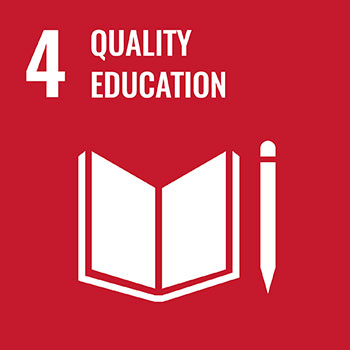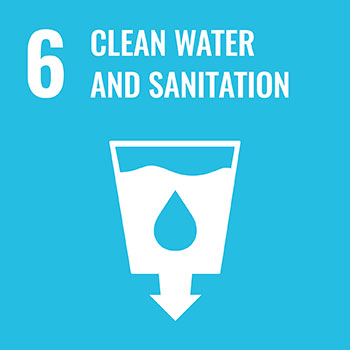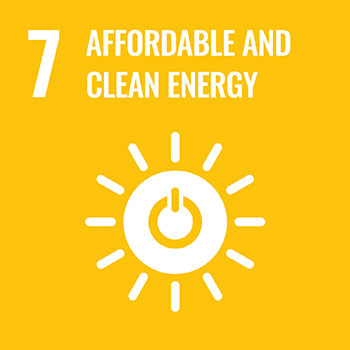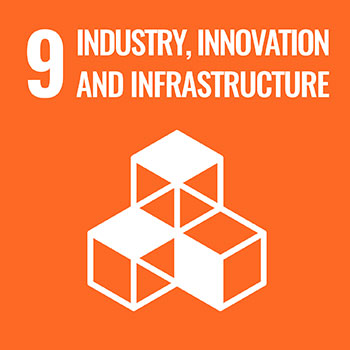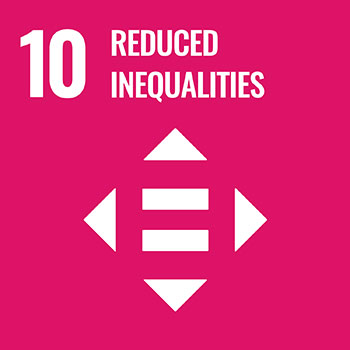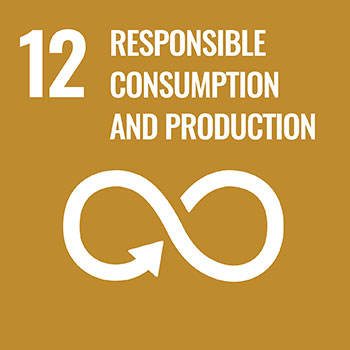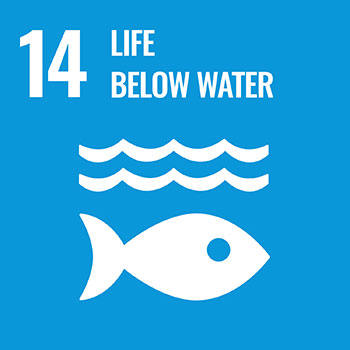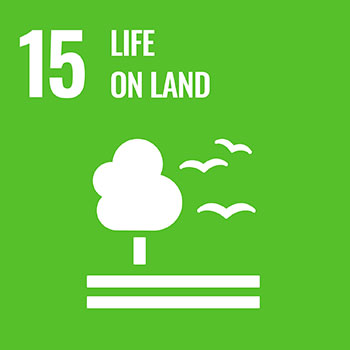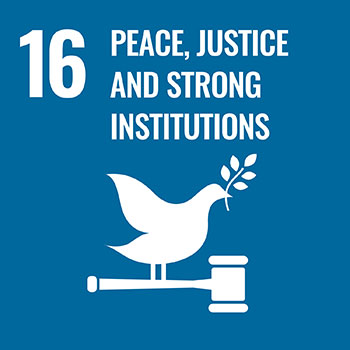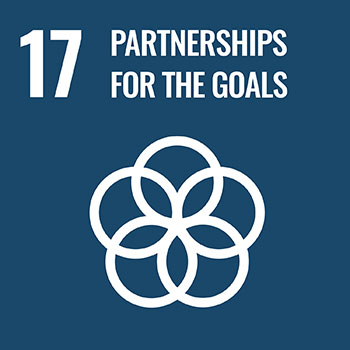Search for academic programs, residence, tours and events and more.
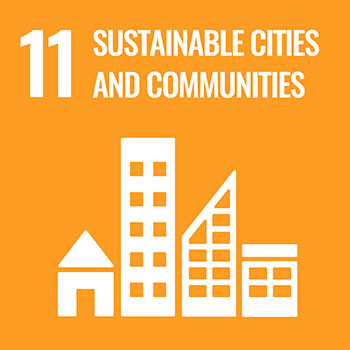
Make cities and human settlements inclusive, safe, resilient and sustainable.
Wilfrid Laurier University engages in a range of initiatives to make cities and human settlements inclusive, safe, resilient and sustainable. By advancing SDG 11, we play a role in enhancing the quality of life for those in our local communities and beyond.
The work that Laurier completed in 2024 to advance SDG 11.
While attending Wilfrid Laurier University’s Brantford Community Safety Search Conference in November 2023, Dave Wiedrick was struck by a statistic shared by Laurier researcher Tarah Hodgkinson. In her assessment of Brantford police activity, Hodgkinson found that 85 per cent of police calls were not related to crime. Most calls were reporting social disorder, such as mental health crises, largely made visible and exacerbated by homelessness. After the conference Wiedrick regrouped with his colleagues in the City of Brantford Encampment Network, a group of municipal staff members and community outreach workers who support individuals in need of housing. They began devising a two-tiered response model with the Brantford Police Service.
An innovative Wilfrid Laurier University course is providing students the chance to create solutions to municipal challenges in the City of Waterloo. Social Innovation in the City immerses students in hands-on opportunities to conduct research, design and test initiatives and policy innovations to find solutions to municipal challenges identified by the city.
The Sustainable Hawk Fund is an initiative of Wilfrid Laurier University’s Sustainability Office that awards up to $30,000 annually to projects that promote sustainability on campus and in the community. The fund is open to students, staff and faculty across all campuses, providing the opportunity to turn sustainability ideas into reality.
Wilfrid Laurier University has appointed multiple award-winning Indigenous writer Alicia Elliott as the incoming Laurier Stedman Fellow. Elliott, who is Mohawk from Six Nations of the Grand River, won the Amazon Canada First Novel Award and Indigenous Voices Award for her 2023 novel, And Then She Fell. The national bestseller was the highly anticipated follow-up to Elliott’s debut collection of essays, A Mind Spread Out on the Ground (2019), itself a bestseller and winner of the Forest of Reading Evergreen Award.
Wilfrid Laurier University has named author Brett Popplewell the winner of its 2024 Edna Staebler Award for Creative Non-Fiction for his book Outsider: An Old Man, a Mountain and the Search for a Hidden Past. The $10,000 prize recognizes Canadian writers for a first or second book that is written in the genre of creative non-fiction and includes a Canadian locale or significance.
Fusion Beats 2024, presented by Wilfrid Laurier University's Hub for Community Solutions, Conestoga Students Inc. and the City of Brantford, was an electrifying evening of multicultural music and dance performances. Admission wasfree and open to the public. This is the second year for the Fusion Beats initiative, following a highly successful inaugural event in September 2023.
Wilfrid Laurier University's Brantford campus kicked off its 25th anniversary year with MarketFest: In Peace and Friendship, a two-day celebration of contemporary Indigenous artists, artisans, performers, thinkers and makers. Free and open to the public, the event transformed the atrium at Laurier’s One Market building into a marketplace of Indigenous vendors, curated by acclaimed Indigenous artist and Laurier alumna Alanah Jewell (BA ’19) of Morningstar Designs. Guests were also invited to attend public lectures on subjects ranging from local history to Indigenization at Laurier and take in live music by contemporary and traditional Indigenous performers.
Opera Laurier presented Into the Woods, a beloved musical with music and lyrics by Stephen Sondheim and book by James Lapine that explores the classic tales of Little Red Riding Hood, Jack and the Beanstalk, and Cinderella.
Black identity, spirituality, fantasy and futurism were explored in the new exhibition, “Hunt, Gather, Remix,” featured from Jan. 8 until April 14 in the Robert Langen Art Gallery at the Wilfrid Laurier University Library. Hunt, Gather, Remix features the work of Toronto-based multi-disciplinary artist Adeyemi Adegbesan, who uses photography, illustration, mixed media collage, murals and assemblage to create Afro-futurist and Afro-surrealist portraits.
Laurier research centres advancing SDG 11.
The Viessmann Centre for Engagement and Research in Sustainability (VERiS) is an interdisciplinary and community-engaged research centre striving to be a catalyst and nexus for the transition toward strong cultures of sustainability. The centre understands cultures of sustainability “as characterized by shared values, symbols, rituals and practices grounded in sustainability principles leading to individual and societal choices that promote environmental protection, social justice and well-being, and a supportive economy." A culture of sustainability may exist within an organization, a building with multiple organizations or a community.
The Laurier Centre for the Study of Canada (LCSC) focuses on the interdisciplinary, multidisciplinary and comparative study of the Canadian experience. LCSC has three objectives:
In pursuit of this mission, LCSC recognizes there are expansive, evolving, and contested interpretations of Canada.
The Laurier Centre for Music in the Community (LCMC) was formed with a mission of connecting Laurier to the wider Waterloo Region community through musical activities, community research and collaboration. The LCMC lives out this mission through research, symposia, publishing, projects, partnerships and concerts. Using music as a conduit, it works to connect community, collaborate with music-makers, and contribute to the vitality of music and people.
Laurier initiatives in 2023 that advanced SDG 11.
All buildings, monuments and natural heritage landscapes on all Laurier campuses and locations are free and open to the public. Laurier is home to 11 heritage buildings, including the Carnegie Library Building and the Lucinda House.
Community members can take self-guided tours of the campus. To support accessibility, free virtual tours are also available.
The Laurier Library provides access to 1.3 million online resources and holds one million print resources that can be accessed through the library’s Omni search system. Community members are welcome to freely access the Laurier Library and borrow books from the library free of charge.
Laurier’s Robert Langen Art Gallery (RLAG) is the university’s visual arts centre and is open to the public for free. RLAG oversees art collections and Laurier’s multicampus milieu and organizes visual arts programming that inspires, challenges and expands learning beyond the classroom. Working with a wide range of university and community partners, the gallery develops exhibitions, artist lectures and arts-related events featuring practitioners who range from students and community members to leading national and international visual artists.
Laurier’s Archives and Special Collections are open to the public. The collecting emphasis is on Laurier, the environmental conservation movement in Canada, the Evangelical Lutheran Church in Canada and its Eastern Synod, music in Kitchener-Waterloo and the history of Waterloo Region. Appointments are not necessary to visit. Laurier Archives and Special Collections staff are happy to provide instruction sessions and tours of the archives.
Laurier's Waterloo campus has five hectares of land that is accessible and connected to the surrounding community through unrestricted municipal vehicle and pedestrian infrastructure. Presently, green space covers 30% of the campus and an ‘urban forest’ runs throughout the campus that members of the community are welcome to enjoy. The campus features a large, 14,000 sq. ft. community garden. Woven into the community garden plots at the Northdale Community Garden is an edible forest featuring fruit trees bearing a variety of apples, pears and service berries.
Community members can take self-guided bike or walking tours of the campus. To support accessibility, free virtual tours are also available.
The Laurier Faculty of Music is host to a variety of events, including more than 100 publicly available concerts, recitals, guest workshops and other community events. Home to the Maureen Forrester Recital Hall and the Theatre Auditorium, the performance halls host thousands of guests each year.
The public can also engage with Laurier ensembles and faculty performances from the comfort of home by streaming past concerts on our Faculty of Music YouTube channel.
Laurier is working locally, nationally and internationally to help preserve cultural heritage. For example:
Through its Sustainability Action Plan, Laurier has established a number of targets for more sustainable commuting. These are measured through an annual survey and by tracking annual commuter and travel data from department and faculty budget expenditures. Targets set include:
Laurier, in partnership with the Region of Waterloo’s TravelWise program, conducts an annual Alternative Transportation Survey to measure and improve sustainable commuting practices. The survey results help the Sustainability Office, Parking and Transportation Resources, and Sustainable Waterloo Region gain valuable insights into student transportation patterns and identify areas for promoting more sustainable, eco-friendly commuting options, including carpooling, public transit, and cycling.
Survey participants were asked a range of questions, including their preferred modes of transportation, familiarity with Grand River Transit (GRT) discount options available to staff, and the challenges they face when considering alternative commuting options such as cycling, carpooling, or public transit. Demographic data was also collected to provide a comprehensive understanding of travel behaviours across different groups within the Laurier community.
The survey results offer valuable insights into how Laurier can enhance its transportation strategies, promote sustainable travel choices, and reduce barriers to adoption, such as lack of infrastructure or convenience, aligning with broader campus sustainability goals.
Laurier offers a variety of programs and initiatives to promote and support a safe and environmentally friendly commute to campus:
Laurier is committed to providing a safe, inclusive and supportive work environment for all employees. This includes providing for remote work. Laurier's commitment to flexible work is demonstrated in policy 8.14 Flexible Work Policy. The goals for Laurier's flexible work include:
This policy applies to Employees in the following non-academic bargaining units and Employee groups:
Laurier upports its employees in finding affordable housing through several initiatives:
Laurier is committed to evaluating housing options for members of its community. The institution is a member of the local Town and Gown committee, which seeks to enhance relationships, communications and policies among the universities, the community and the city. The committee evaluates a number of issues, including housing. The committee produced an accommodation report in 2023.
Laurier’s Student Life units oversee and evaluate housing options for students both on and off campus. Laurier provides various affordable on and off-campus options, including dormitories and apartments.
In addition, Laurier has partnered with Places4Students.com, an off-campus housing website that specializes in providing students, schools and landlords with a quality rental property listing service. The institution recently formalized a partnership with SpacesShared, an online platform that pairs students looking for affordable accommodations with older adults who have extra space in their homes. The partnership will create new housing options for Laurier students in Waterloo and Brantford and give older adults a way to leverage a spare bedroom for some extra income, company and assistance around the house.
Laurier also offers financial aid for students to assist with costs associated with housing.
Laurier is committed to evaluating housing options for members of its community. The institution is a member of the local Town and Gown committee, which seeks to enhance relationships, communications and policies among the universities, the community and the city. The committee evaluates a number of issues, including housing. The committee produced an accommodation report in 2023.
Laurier prioritizes pedestrian access on campus through the provision of multi-use paved walking and cycling paths connected to the city pathway system, which provide safe and reliable paths for the community year-round. The university's interconnected pathway system can be seen in Laurier's interactive maps.
Laurier is helping to address the affordable housing crisis in Canada. Our faculty and students are working on developing innovative solutions and supporting their local communities.
As outlined in our Sustainability Policy, Laurier is committed to maintaining sustainability design standards for major projects that will enable the university to work toward LEED green building standards for new builds and introduce principles of sustainable construction, renovations and landscape design, making use of full cost cycle accounting. For example:
Laurier has strategically expanded its building portfolio by retrofitting brownfield building sites, particularly on the Brantford and Waterloo campuses. Through adaptive reuse, the university has revitalized historic structures and former industrial sites, transforming them into vibrant academic spaces. This approach aligns with Laurier’s commitment to sustainability, blending heritage conservation with modern functionality. The Brantford campus exemplifies this through its repurposing of downtown landmarks, while the Waterloo campus continues to integrate sustainable development into its growth strategy.
Discover how Laurier is contributing to United Nations Sustainable Development Goal targets.



